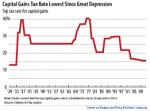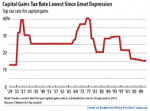You can always find blame on all sides, but as Calamity said, the Moron-in-chief, was primarily responsible. And now we have Chump, building huge deficits with tax cuts for billionaires.
I understand Calamity's assertion. But the Commission on Financial Responsibility didn't see it that way.
Certainly, the Bush Administration has culpability in the inefficient manner in how the SEC failed to monitor and enforce lending laws and the derivative market. But as Michael Lewis' book points out, the issue quite frankly was that the SEC could not keep qualified, knowledgeable investigators as they left for more profitable positions in the private sector.
However, much of the oversight lapses and scorn by the Commission was reserved for the Federal Reserve. And while their transgressions certainly occurred during the Bush Administration, the Federal Reserve is an independent entity. Outside of appointing the Fed's Chairman and Board of Governors, the administration has little power over the Federal Reserve.
The Commission also zeroed in on the abuses in GSE's such as Fannie Mae and Freddy Mac. Here the story is interesting as President Bush and his administration saw danger coming as early as 2001. In his FY02 budget proposal, President Bush stated called these entities "a potential problem," because "financial trouble of a large GSE could cause strong repercussions in financial markets, affecting Federally insured entities and economic activity."
In 2003, his then-Treasury Secretary's congressional testimony called for Congress to enact "legislation to create a new Federal agency to regulate and supervise the financial activities of our housing-related government sponsored enterprises."
In 2004, the Bush Administration once again warned that "the Administration has determined that the safety and soundness regulators of the housing GSEs lack sufficient power and stature to meet their responsibilities, and therefore … should be replaced with a new strengthened regulator."
In fact, the Bush Administration called for the tools for tighter regulation 17 times. The Democrat response?
Representative Barney Frank (D) responds in 2003 to calls for more regulation by saying that "these two entities – Fannie Mae and Freddie Mac – are not facing any kind of financial crisis … The more people exaggerate these problems, the more pressure there is on these companies, the less we will see in terms of affordable housing" and Senator Thomas Carper (D) adds that "if it ain't broke, don't fix it." In fact, in 2005 nearly every Republican supported and nearly every Democrat opposed legislation in 2005 which would have would have prohibited the GSEs from speculating on the mortgage-based securities they packaged.
At least Democrat Rep. Artur Davis gets credit for finally admitting:
"Like a lot of my Democratic colleagues I was too slow to appreciate the recklessness of Fannie and Freddie. I defended their efforts to encourage affordable home ownership when in retrospect I should have heeded the concerns raised by their regulator in 2004. Frankly, I wish my Democratic colleagues would admit when it comes to Fannie and Freddie, we were wrong."
So, I'm not sure if you were aware of these facts when you wrote your post. If not, no worries. We all have jobs and other responsibilities that preclude us from always digging out the details of an issue. We just should be wary of putting out "bumper sticker" comments and confusing them with fact.



